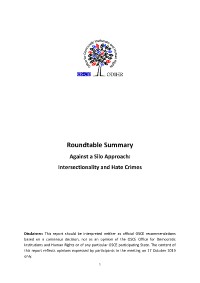https://tandis.odihr.pl/handle/20.500.12389/22594
| DC Field | Value | |
|---|---|---|
| Country Coverage | OSCE region | |
| Accessioned Date | 2020-01-27T14:38:19Z | |
| Availability Date | 2020-01-27T14:38:19Z | |
| URI | http://hdl.handle.net/20.500.12389/22594 | |
| Notes | "I. Introduction and background information On 17 October 2019, the OSCE Office for Democratic Institutions and Human Rights (ODIHR) organized a roundtable titled “Against a Silo Approach: Intersectionality and Hate Crimes” in Copenhagen, Denmark. ODIHR has a mandate to collect information and statistics on hate crimes and relevant legislation provided by OSCE participating States as well as to assist participating States to ensure a “comprehensive approach to the tackling of hate crimes.” While hate incidents based on multiple motives are documented in ODIHR’s hate crime reporting, efforts to address such hate incidents through an intersectional approach are limited. In order to further an understanding of intersectionality in the context of hate crime – with a focus on sex/gender – ODIHR invited 17 practitioners, civil society representatives and scholars working in the areas of hate crimes, gender and intersectionality. The objectives of the event were to reflect on how an intersectional analysis of multiple-bias hate crimes could help deepen understanding of how sex/gender intersects with other protected characteristics, and how this might affect a person’s vulnerability to hate crime and the subsequent remedial actions taken. Clearly, an intersectional approach to hate crimes can be adopted and operationalized in countries where policies to address hate crime are in place. ODIHR’s reporting and capacity-building work shows that not all commitments on hate crime have been fully implemented across the OSCE region. Hence, more work continues to be necessary in this field. The envisaged outcomes of the roundtable were four-fold. First, the event gave experts in the field of hate crimes and intersectionality the opportunity to present their work and approaches, as well as to take stock of good practices and challenges in data collection, investigation and prosecution of hate crimes based on multiple motives, including a sex/gender bias. Second, the roundtable examined how using the theory of intersectionality could benefit hate crime prevention and response, as well as evaluate its potential impact on gender equality. Third, the roundtable participants endeavoured to identify good practices and challenges in operationalizing intersectionality to address hate crimes through group work. Finally, the roundtable presented advocacy, coalition-building and networking opportunities for participants. The roundtable was divided into three sessions: 1) Good practices and challenges in data collection, investigation and prosecution of hate crimes based on multiple motives, including a sex/gender bias. 2) What would an intersectional approach to addressing hate crimes entail and what would its main benefits be, including in terms of gender equality? 3) Good practices and challenges in integrating an intersectional approach to hate crimes, which also involved group work. This final report presents a summary of the participants’ presentations and follow-up discussions with suggestions; a list of recommendations stemming from the group work; and conclusions and action points for ODIHR specifically." | |
| Format | ||
| Language | en | |
| Subject Keywords | sexual orientation | |
| Subject Keywords | gender identity | |
| Subject Keywords | gender | |
| Subject Keywords | hate crime | |
| Title | Roundtable Summary: Against a Silo Approach: Intersectionality and Hate Crimes | |
| Material Type | conference materials | |
| Meeting Title | Roundtable “Against a Silo Approach: Intersectionality and Hate Crimes” | |
| Corporate Authors | OSCE ODIHR Tolerance and Non-Discrimination Department (TND) | |
| Key Issues | Hate crime | |
| Meeting Place | Copenhagen, Denmark | |
| Physical Description | 13 p. | |
| Meeting Date | 17 October 2019 | |
| Fulltext | With Fulltext | |
| Fulltext Grant | open | |
| Related Country | Albania | |
| Related Country | Andorra | |
| Related Country | Armenia | |
| Related Country | Austria | |
| Related Country | Azerbaijan | |
| Related Country | Belarus | |
| Related Country | Belgium | |
| Related Country | Bosnia and Herzegovina | |
| Related Country | Bulgaria | |
| Related Country | Canada | |
| Related Country | Croatia | |
| Related Country | Cyprus | |
| Related Country | Czech Republic | |
| Related Country | Denmark | |
| Related Country | Estonia | |
| Related Country | Finland | |
| Related Country | France | |
| Related Country | Georgia | |
| Related Country | Germany | |
| Related Country | Greece | |
| Related Country | Holy See | |
| Related Country | Hungary | |
| Related Country | Iceland | |
| Related Country | Ireland | |
| Related Country | Italy | |
| Related Country | Kazakhstan | |
| Related Country | Kyrgyzstan | |
| Related Country | Latvia | |
| Related Country | Liechtenstein | |
| Related Country | Lithuania | |
| Related Country | Luxembourg | |
| Related Country | Malta | |
| Related Country | Moldova | |
| Related Country | Monaco | |
| Related Country | Mongolia | |
| Related Country | Montenegro | |
| Related Country | Netherlands | |
| Related Country | North Macedonia | |
| Related Country | Norway | |
| Related Country | Poland | |
| Related Country | Portugal | |
| Related Country | Romania | |
| Related Country | Russian Federation | |
| Related Country | San Marino | |
| Related Country | Serbia | |
| Related Country | Slovakia | |
| Related Country | Slovenia | |
| Related Country | Spain | |
| Related Country | Sweden | |
| Related Country | Switzerland | |
| Related Country | Tajikistan | |
| Related Country | Turkey | |
| Related Country | Turkmenistan | |
| Related Country | Ukraine | |
| Related Country | United Kingdom | |
| Related Country | United States | |
| Related Country | Uzbekistan | |
| Appears in Collections: | Resources on hate crime Documents | |
Files in This Item:
| File | Description | Size | Format | |
|---|---|---|---|---|
| 22594_EN.pdf | English | 400.72 kB | Adobe PDF |  |

